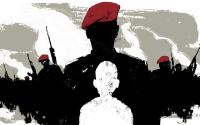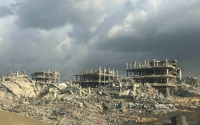28 November 2007
Ntsiuoa Ralefifi, 29
Ntsiuoa, from Harom Hapi, discovered she was HIV positive while pregnant with her first child last November. Her husband lives in Johannesburg.
"I cried so much. I cried because I was afraid that I was going to die, together with my child. I had to start treatment and I am still taking it. Now I am getting better. I am happy because my child is HIV negative. After the birth, they gave her drops of nevirapine [an antiretroviral drug]. My baby's name is Ntatisi, which is the name of a princess. I want her to grow up well, to attend school, and to live a better life. She's lovely.
"At the hospital we have a support group. They always tell us to take care of our lives, have safer sex, eat very well, and take our drugs at the same time, in the morning and in the evening. We meet friends there, we sing, they give us food. Sometimes I go there with a painful heart, maybe because I don't have anything to eat. Sometimes we don't have enough money to pay the taxi, and it takes us two to three hours on foot. We sing songs about our status. One goes like this:
'Lord make us one, Lord make us one, Lord make us one, Lord make us one.
Help us God, to live longer, help us God, to live longer.
We know that we live, with HIV, we know that we live, with HIV.
We ask our power, from you God, we ask our power, from you God, to live.' "
Lerato Chakalane, 31
Lerato, from Mohale's Hoek, is a clerk in a magistrates court. She has two children.
"I found out I was HIV positive a few months ago, when I was three months pregnant with my baby. I wasn't shocked. My only worry was thinking whether this baby would come out HIV negative or positive. I felt such relief when I saw the baby was alive and looked healthy.
"Soon after the birth, the nurse gave her some medication to prevent HIV passing from me to my baby. Maybe she won't get the disease that I have. Maybe the results will come out negative. The day I find out my child is HIV negative I will be really happy. I find out in six weeks' time.
"I have named my baby Kelumetse - in English it means 'I believe'. I did that because I believe she is special. If it wasn't for her, I would not know my status. That's what makes her special to me."
Tsepang Lebete, 19
Tsepang lives in Hakonoti. She has a two-year-old son, Rethabile, which means 'we are happy', and is nine months pregnant with her second child.
"My second child was not planned and I was worried because I knew I was HIV positive. I found out about my status after my first baby was born. Community helpers were going house to house to test people. Rethabile is not healthy. I have tested him once and the results were not clear so I will test him again. But I know that my new child can be born without HIV.
"My baby is coming in two weeks and I am going to have it at hospital. I want to take the medicine in the right way so that my baby can be born negative. Then I will follow the nurses' instructions and breastfeed my baby for six months, no other food, as I want to have the happy day when they tell me my baby is negative.
"My hope for the future is that my children will attend school and live happily, like all the other children in the village. I want to be able to grow them strong and healthy."
Mathakane Metsing, 24
Mathankae lives in Mafeteng and works as a counsellor at the hospital. She discovered she was HIV positive when she was pregnant in 2005.
"I was so shocked. I did not know what to do or who to turn to. I went home and I spent the night crying. The following day I told my boyfriend. He helped me and advised me. We are still in a relationship, but he is studying in South Africa. That boyfriend is not my child's father. I was working as a maid in the father's house and he forced me to have sex with him. I think that he infected me. I learned later that he was on treatment, but he did not tell me that he was HIV positive.
"I was three months pregnant when I found out I was HIV positive. The nurses in the clinic gave me the drug nevirapine to take home and told me to take it when I felt serious labour pains. I swallowed my nevirapine at half past 12 in the night and the baby was born the following morning at half past seven. After the birth, she was given nevirapine syrup.
"When she was two months old she had the DNA PCR test, which can tell at an early age if the baby is infected. She was the first baby in Lesotho to have this test. It took a month for the results. The day I learned that she is HIV negative was the best day of my life. Her name is Tlhonolofatso. In English this means 'blessing'. She is very healthy - she is fat, beautiful, and strong, she has long hair, she is black in colour, she is active and playing all the time. I think she is very intelligent and often she surprises me with what she can do for her age.
"I feel healthy and I take good care of myself. But my mother, who is 55, is very sick. She has Aids and my uncle had to rush her to the hospital yesterday. She has been sick since last year, but I think she was in denial. I feel sad. I am asking God what we did. I don't understand - the same family, the mother, the child, even my sister, all HIV positive.
"My own experience makes me want to help others. That is why I am now working at the programme called Mothers 2 Mothers at Mafeteng hospital. It is where mothers who are HIV positive come for help and emotional support. The main part of my job is doing one-to-one counselling. Most of them are dealing with stigma, fear, relationship problems, poverty, lack of knowledge and so much more. I try my best to help them in the short time we have. Many have never seen a person who is openly HIV positive, so it helps them if I tell them my status. I explain what I did to protect my baby so she was not infected with HIV. I tell them what they can do to live longer, and I stress that HIV is not a death sentence.
"Twice a week we hold a support group for HIV positive mothers at the hospital. Often women are afraid at first to come to the meetings, but they soon learn that sharing their problems and burdens makes them lighter. We dance and sing about HIV.
"Almost 40% of people who are my age in Lesotho are infected, but everyone is hiding. It is so important that more people become open, like me, so the disease can have a face. Every person, especially pregnant women, should know their status. We need a new generation who are not HIV positive. My hope is that within five years there will be no more HIV positive babies born in Lesotho. By then all of the women should have tested themselves and, if they are positive, have the knowledge about how to prevent the virus passing to their babies. That is my dream."
Matisetso Pahlabaki, 31
Matisetso, who is from Masaleng, has four children, aged 13, 10, six and eight months. The three oldest have not been tested. She discovered she was HIV positive while expecting her youngest.
"When I found out, I did not take it seriously. I didn't worry about it and did not do anything. I did not say anything to anybody, I just forgot it. I went on with life as usual. I gave birth at home. I did not know there was a medicine that prevents me passing HIV to my child. Had I known, I would have taken it so that my baby would not get sick. Now I am so worried that my baby might be HIV positive. She is always sick. There is a rash, which goes and comes. Sores on the mouth go and come. But what worries me most is that the baby has lost weight. Today we took her to the clinic to be tested. If I find that she is positive, I will be so worried. But I will also be happy to know so that I can go to the doctor and help her. My husband is also sick. He has tuberculosis, so we also took him to the clinic to be tested for HIV. He coughs a lot at night and he does not eat. He has lost weight. I am worried that he might be HIV positive.
"We got up early to walk to the hospital at Mohale's Hoek. It is so far. We have to cross one river, climb the mountain and the plateaus, walk and walk. It takes me two hours to get to the road. After this walk, we get a taxi for one hour to get to the hospital.
"The doctor said the baby is sick. I need to come back to get the results. She was given a medicine, one for the morning and one for the evening. My husband has been admitted to hospital for two months because of his illness. I can't come and see him because I am not working and have no money for transport. I am so sad. My baby's name is Retsepile. It means 'we hope'."
Mathato Notsi, 29
Mathato has four children and lives in Tsita's Nek. Her husband lives in Johannesburg. Her baby is called Mpho, which means "gift".
"In February this year I took Mpho for a six-weeks' examination after birth. That's when I discovered that I was HIV positive, and so was he. Initially, it was a great shock. After talking to the nurses at the dispensary I came to terms with it, but it wasn't a good feeling for a very long time. I telephoned my husband to inform him. He said it's fine, I should not stress myself; I should just accept that I'm HIV positive.
"When I was pregnant, I used to go to the clinic, which is quite a distance from here. They did tell us about HIV but I was afraid of testing because of all the things people were saying about Aids. It was this horrible disease that only the promiscuous would get. Despite my fear, I was discouraged by my husband, who always felt that there was no need to test.
"Maybe if I'd have tested when I was pregnant I would have not infected my child. I do regret not having a test a lot. It is very painful when I see my child sick. He developed a rash all over his body. We are always going back to the clinic for medication. He has been on antiretroviral treatment for three months now. I am really struggling to raise all my kids because the small one is always sick and I always have to give him the first priority. It means I don't look at the other children. The other children love him a lot and look after him when I go to collect water.
"Every morning when I wake up I sweep outside, then I make my bed, then after that it's time to give my child medicine. I have to hold his hands because he doesn't like taking it; he always cries. I give him three different medicines, AZT, 3TC and nevirapine, at seven in the morning and seven at night. And he now knows the bottles - when I bring them he starts crying, and sometimes he forces himself to vomit.
"I know that I am going to have to give Mpho medicine all his life, and I have accepted this. He is now 10 months old, and his life has been difficult, but since he started using the medicine I've seen a big improvement. Before, he was always sick.
"I want my baby to grow up well and I want to teach him well until the time when I will tell him about his status. I want him to be able to go to school without any problems because of the disease.
"It's hard for me to think a lot about my future because I cannot see myself moving or leaving the baby, or living far from him. If I have to find a job it will have to be a job where I can always be able to see him when he needs my help. I wish my child could be well, like other children, not always be sickly, and live a normal life. But because of his disease he has become very close to my heart."
· All pictures © Gideon Mendel/Corbis for Unicef.
· For more information, go to unicef.org.uk/lesothovoices. World Aids Day is on Saturday.






